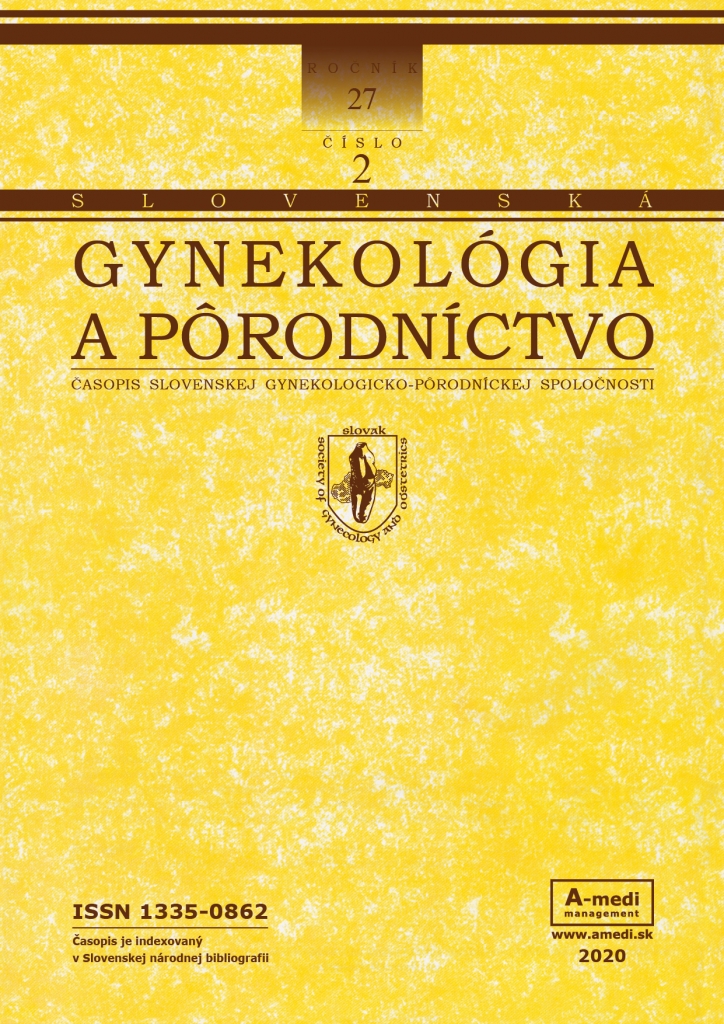
Slovak Gynecology and Obstetrics
- Článok
- Obsah 4/2017
- Archív
- Voľne dostupné články
- Redakčná rada
- Pokyny pre autorov
- Autodidaktické testy
Téma:
IMPACT OF MATERNAL OBESITY ON THE FUNCTION OF THE PLACENTA AND FOETAL DEVELOPMENT
A. Totka, M. Gábor, Ľ. Argalášová, M. Šimko
The epidemic of obesity is currently the most critical global health problem. Currently,
obesity affects approximately one third of reproductive age women, which leads
to a high incidence of obesity during pregnancy. Pregnancy obesity affects the
regulation of placental hormones and via signalling molecules affects the function of
trophoblast, growth and foetal development. There is an association between obesity
and infertility. The cause is an elevated insulin level that affects ovarian function
and an endometrial mucosal effect and ovulation.
A healthy lifestyle, balanced diet and regular physical activity could help reduce
the overweight of women, resulting in homeostasis of adipokines and other placental
hormones necessary for the fate of further foetal development during pregnancy.
Ročník 2017 Témy časopisu Slovak Gynecology and Obstetrics 4 / 2017
Original works
Case study
doc. MUDr. Martin Redecha, PhD.
EDITORIAL BOARD
prof. MUDr. Miroslav Borovský, CSc.
prof. MUDr. Ján Danko, CSc.
prof. MUDr. Karol Holomáň, CSc.
MUDr. Ľudovít Janek
prof. MUDr. Štefan Lukačín, PhD.
prof. MUDr. Miloš Mlynček, CSc.
prof. MUDr. Ján Štencl, CSc.
doc. MUDr. Ivan Hollý, CSc.
doc. MUDr. Miroslav Korbeľ, CSc.
doc. MUDr. Jozef Višňovský, PhD.
doc. MUDr. Pavol Žúbor, DrSc.
doc. MUDr. Igor Rusňák, PhD.
MUDr. Jozef Adam
MUDr. Tibor Bielik, PhD.
PUBLISHER
Slovenská gynekologicko-pôrodnícka spoločnosť
Adresa: Antolská 11, 851 07 Bratislava
IČO 31802800, DIČ 2021515243
telefón-fax: 02/68 67 2 725
e-mail: slovenskagynekologia@gmail.com
EDITORIAL OFFICE OF JOURNAL
A-medi management, s. r. o.
Kupeckého 3,821 08 Bratislava
IČO: 44057717
telefón-fax: 02/55 64 72 47
e-mail: amedi@amedi.sk, www.amedi.sk
EDITOR-IN-CHIEF
Ing. Danica Paulenová
e-mail: paulenova@amedi.sk
GRAPHIC LAYOUT AND TYPESETTING
Lucia Vecseiová
e-mail: dtp@amedi.sk
MARKETING MANAGER
Ing. Dana Lakotová
mobil: 0903 224 625
e-mail: marketing@amedi.sk
LANGUAGE PROOFREADING
Mgr. Eva Doktorová
PROOFREADING OF ENGLISH TEXTS
Mgr. Jana Bábelová
ECONOMY AND SUBSCRIPTIONS
Ing. Mária Štecková
telefón: 02/55 64 72 48
mobil: 0911 117 949
e-mail: ekonom@amedi.sk

